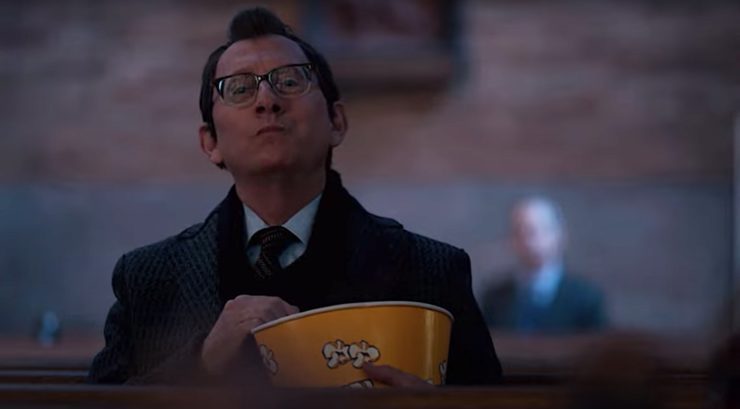Evil is back for a third season! I am very, very excited to return to Robert and Michelle King’s creepy, possibly-supernatural, possibly-AU New York City, and to check in with newly-ordained Father David Acosta, increasingly-unhinged Kristen Bouchard, and increasingly-shattered Ben Shakir.
But before we dive into the new episodes, I wanted to look back on one of my favorite elements of season two: the show’s fascinating handling of the idea of forgiveness.
Here is by no means exhaustive list of the highlights of Evil’s second season:
- Evil dolls!
- Haunted abandoned medical schools!
- Sexy night terror demons!
- Metaphorical zombies!
- LITERAL cannibals!
- Episode title cards in the form of a legitimately frightening pop-up book called “The Book of Terrifying Tales”!
- A very sweet nun with (real???) stigmata!
- A super no-nonsense nun played by SCTV comedy icon/original Godspell cast member Andrea Martin!
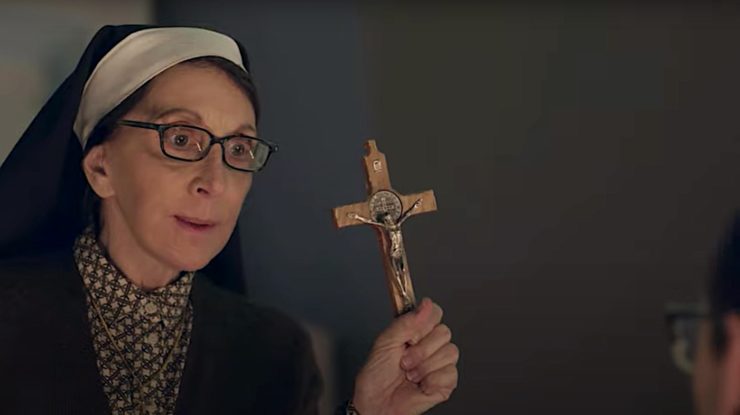
- An Ifrit!
- A conflicted priest!
- A conflicted murderer!
- UFOs, probably!
- One of the scariest hours of television I’ve ever seen!
- Seriously, ever!
- And I’m a person who thought The X-Files’ episode “Home” was a lark!
These are just a few scattered moments! This season looked at the batshit maximalism of season one and scoffed at its restraint! I haven’t even mentioned the episode where everyone’s silent for almost the entire hour!
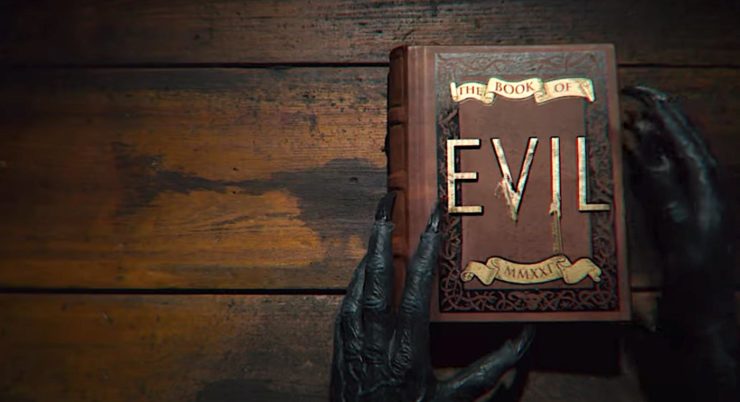
For someone like me, a pop culture critic who is maybe too willing to find meaning in detritus, this show (which is, to be clear, NOT detritus) is like a goddamn five-course meal. There are a lot of ways you can read the show. You can dig into its overt social grappling in episodes like “C is for Cop” or “Z is for Zombie”, which deal with racist policing practices and anti-worker warehouse conditions, respectively. You can look at the ways it tackles religious horror in “A is for Angel”, or the way it puts Islam and Christianity in conversation in “F Is for Fire”, or how it treats religious professionals in its characterization of Mike Colter’s David Acosta and Andrea Martin’s Sister Andrea. Or you can look at the sheer over-the-top-ness of any show that can produce that excited list above.
But what fascinated me is that a show that can be so gloriously silly can also thread multiple plots about remorse and forgiveness. Which sounds huge and heavy, and it IS, but I’m also excited that a show that could have just been “religious horror” instead tried to really drill into what remorse and forgiveness are, and how they can play out for people who are resolutely secular.
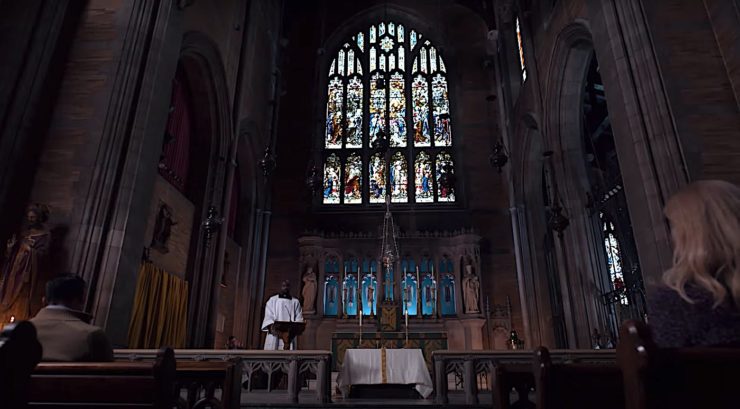
In a move that I quite liked, David’s big arc in season two focused on questioning whether reconciliation and forgiveness are even possible, which the show explored through two narrative thread that mirror each other in surprising ways. Leland Townsend fakes the desire for forgiveness. He claims to want an exorcism, first so he can force David and Kristen to spend more time on him, and, as later becomes clear, to con some of the church higher-ups into giving him a position of power. When he requests an exorcism he’s putting David in an awkward position—David doesn’t believe he’s sincere, but David’s bosses do. And of course, if it turns out Leland is sincere David’s contractually obligated to forgive him. There’s the added problem that about halfway through the exorcism David comes to believe that God is taking the exorcism seriously, even if Leland himself is not.
This mirrors the more external arc of David’s first homily, about the U.S.’s original sin of racism, which ends up put David in conversation with a former priest who now runs a progressive Protestant congregation because he got fed up with the Catholic Church’s discrimination. David wants to remain Catholic, become a priest, and change things from within. A lot of his Black classmates and friends think that’s impossible. Meanwhile, it seems like the Church itself (or at least the representation of it we see here) is very eager to skip straight to being forgiven without the whole “repentance” part. They’re willing to let David deliver his uncensored homily—but only to a small, nearly empty church, forcing him to see that they want him to be grateful for how open-minded they’re being. To stop pushing for a more difficult conversation about the Church’s role in society.
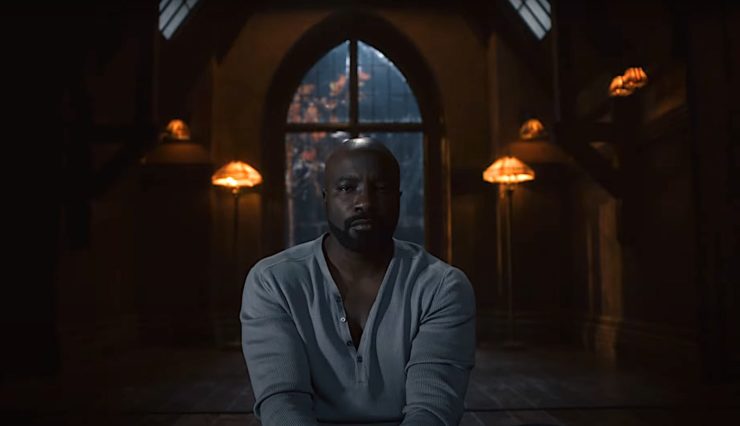
When David visits his new friend’s church he sees parishioners working together on a banner for a Black Lives Matter march. When his friend points out that in David’s denomination protest banners and march attendance would be a subject of committee debates rather than action David can’t really disagree.
So….how different are Leland and David’s superiors, really? Aren’t they both using David to an extent? Leland uses him to get closer to Kristen and her family, and ultimately to get closer to the Assessors overall, so he can undermine their investigations and worm his way into the lives of the people David, Ben, and Kristen are trying to help. Meanwhile David’s higher ups in the Church use him as a symbol of progress and unity—but only if he plays along and doesn’t ask them to confront systemic racism and hatred.
Ben’s season two arc also focuses on forgiveness along with digging into his backstory. We learn that he dropped out of college to work in bioengineering. He developed a gene therapy program that, at first, seemed like a medical revolution—but apparently it went drastically wrong. This seems to be the root of his tension with his family, his decision to leave science behind to instead work as a sort of jack-of-all-trades, and possibly part of his reason for leaving Islam.
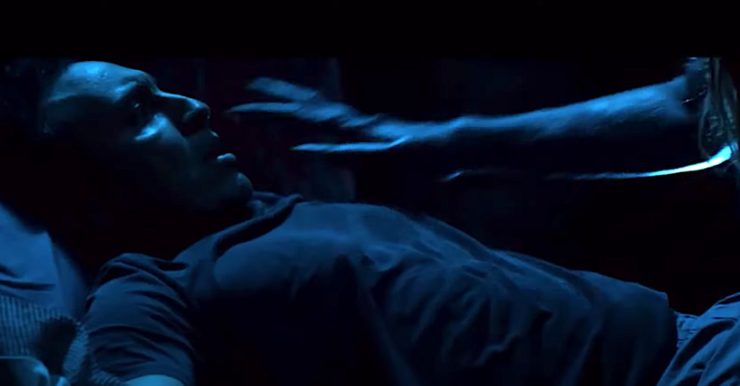
His ongoing guilt results in night terrors, but instead of Kristen’s buddy George, he’s visited by Abbey, a female demon who acts seductive right up until the moment she does something horrific to him. Just like Kristen, Ben uses a variety of techniques to try to break himself out of the dreams, until he literally and figuratively hits rock bottom in my favorite episode of the season, “E is for Elevator.” The episode centers on “the elevator game”—a viral game that involves riding in a haunted elevator and pressing certain floors in sequence to encounter a ghost and visit some sort of nether region. The game seems to have resulted in the disappearance of a teenage couple, and Kristen, Ben, and Kristen’s daughters end up investigating for the parents of one of the teens.
Ben figures out the game’s code: pushing the right combination of buttons means that the elevator takes him down to a spooky, abandoned sub-basement. He rushes into the basement to try to find the kids, only to realize that the call buttons on the wall are disabled, and the cavernous underground room has almost no cell reception. He’s trapped. Even worse, he does find the kids, but they’re long dead. Their bodies, twined around each other, have been skeletonized by swarms of cockroaches. (Again, I don’t scare easy, but I’ll admit these roaches have haunted my dreams since I saw this episode.) This leads to an agonizing sequence as he realizes he’s trapped, watches his phone’s battery drop lower and lower, and admits that his chance of rescue is nonexistent. Which is when Abbey shows up. She taunts him about his impending death, and he tries to ignore her, but does take her advice on writing some goodbye messages on his phone. But then, shockingly, and much to Abbey’s amusement, he starts reciting a du’a.
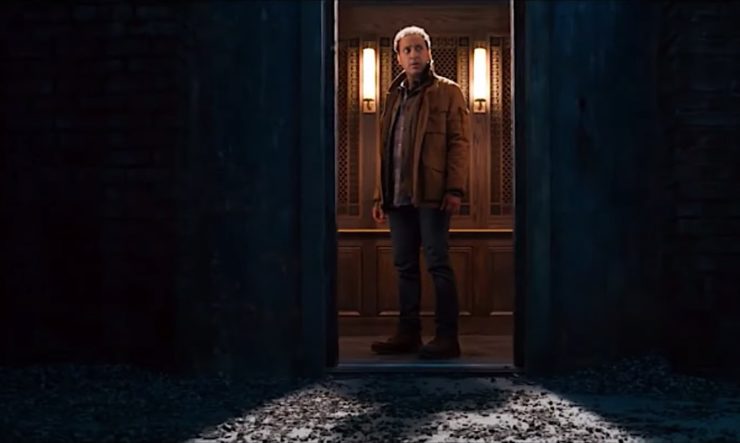
After his rescue he asks for Kristen’s advice on the night terrors, and she suggests he bring a weapon to bed with him and try to remember it in his dream. Unlike the knife she used, he repetitively plays a videogame until he dreams himself into it and uses one of the game’s weapons against Abbey—a fantastic way to bring tech into the age-old fight against night terrors. But! The reason he finally defeats his demon isn’t just his own creative fighting style, it’s also that David shows up in the dream to help him.
Between the recent confrontation with death and the realization that he sees David as a protective figure, Ben’s shaken enough to ask David for advice on seeking forgiveness outside of a religious structure. What I love is that David doesn’t ever try to push religion on his secular friend. Instead, the priest-in-training draws on the techniques he learned in recovery, that can be completely divorced from any type of spirituality. In David’s framework, Ben can ask for forgiveness from anything larger than him. He doesn’t have to work through the structure of Islam, or attempt to contact the families that (I’m assuming) were harmed by his genetic work—he can literally ask for forgiveness from the Unites States Postal Service.
Which is what he does.
And it’s a little awkward, but also hilarious and sweet when he bumps a postal worker and gets the man to formally forgive him. But he seems to feel better! At least until “B is for Brain”…which adds a whole new knot to Ben’s tangled emotions as he tries to face unresolved feelings about his late mother. (I’m guessing the threads from “B is for Brain” are going to get picked up a lot in the Season 3.)
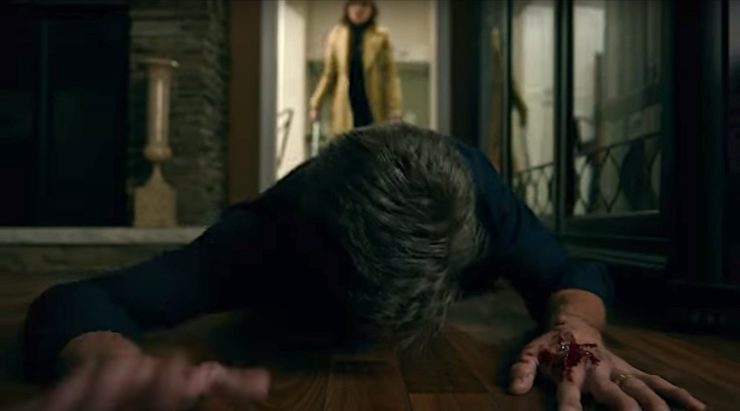
And finally we come to Kristen. She’s eaten alive with guilt—but also righteous anger—over her murder of Orson LeRoux. The writers very skillfully seed her fear across the season—first she tells her therapist, Kurt, who prescribes various medications. Then the show ratchets up the fear of getting caught by the cops, but then, after that danger is removed, Kristen’s real fear comes to the fore—that David will be unable to forgive her and continue their friendship if he learns that she’s a murderer. (Also how cool is it that the writers make their love for David central to both Ben and Kristen’s arcs?) I loved how the show dealt with both Kurt and the legal aspect—Kurt’s hilarious as a character, and his matter-of-facet response is exactly what I was expecting from him.
And in the meantime, it’s obvious that Detective Byrd suspects Kristen for the killing immediately, and is just doling out rope to see when she’ll hang herself. But when Kristen’s guilt finally boils over and she confesses, murder weapon in hand, Detective Byrd waves it away and all that tension collapses. Wasn’t this supposed to be one of the big throughlines of the season? A tense cat and mouse game? But no! Byrd’s just glad LeRoux’s off the streets, this is a simple cover up. And then Byrd twists the metaphorical ice axe by telling Kristen that they’ll report a “large Black man” in her neighborhood, so no one back at the office will ask any questions. Now Kristen is (even more) complicit in exactly the system she’s spent the episode railing against. How many men are going to be stopped and frisked because she allowed this? How many times will David be in danger if he comes by her house? But she allows it, because to do otherwise would destroy her life.
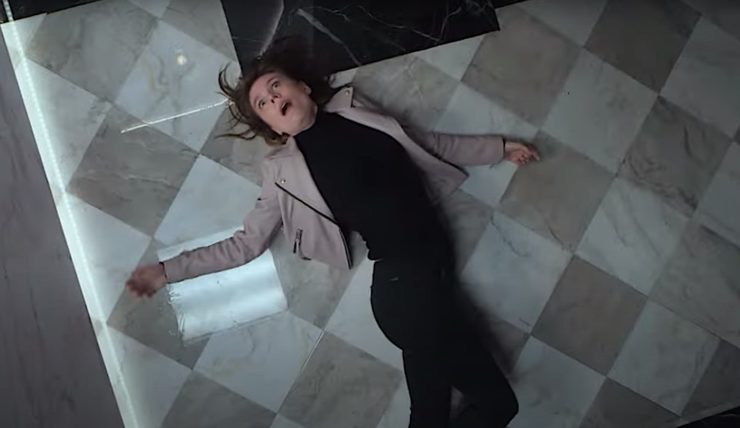
Legally she’s off the hook, but morally? Her crime results in hallucinations, she feels estranged from her husband, she heats a crucifix and repeatedly burns herself with it, and finally fucks a fake Satanist in her car to fully wallow in her own depravity. This all heads in exactly the direction I was expecting: straight into Leland Townsend. When Kristen learns that Leland has been visiting Lexi at school (!!!) she grabs her trusty ice axe walks out the door…but instead of visiting Leland she goes to David and sobs out that she wants to confess.
This time, instead of David suggesting a secular alternative as he did for Ben, he helps the formerly Catholic Kristen goes through a formal rite of confession. And this is what doesn’t work for me. We had already seen Kristen be emotionally and physically effected by Leland’s exorcism, but even she referred to it as a “placebo”. In her confession, however, she recites exactly what David tells her to, aiming her remorse directly at God…or at David himself. And yes, she could just be going through a ritual expiation for psychological benefit, using language that was familiar to her as a child—but BEN didn’t do that. He didn’t ask for it, and David didn’t suggest it, instead thinking up a secular alternative. So why, after two seasons of Kristen being just as skeptical and secular as Ben, does she revert to the rituals of Catholicism? When she feels the need to punish herself, why does she use crucifixes?
And yes, the fact that the show then goes full Fleabag as the two end the confession with a passionate make-out session, also bugs me. Kristen is clearly going through some conflicted feelings about her sexuality and relationship, fine. She’s now flirted with men at bars, fucked a fake Satanist in a car, insisted on using masks in bed with her husband, maybe/kinda/sorta flirted with a Dutch nun, and now, finally, has allowed herself to become physical with her friend and coworker. That part makes sense to me and is just the culmination of a whole bunch of stuff that she needs to confront.
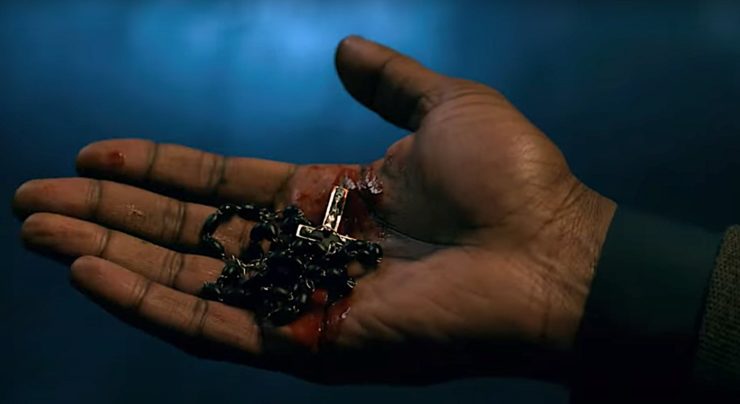
No, the aspect that bothers me is David. We’re told that David has dealt with sex addiction. He broke his celibacy vow, once, with his dead partner’s sister. Occasionally we’d see Leland harassing him in scenes that were either real demonic attacks or hallucinations. But as his ordination looms, he’s suddenly beset by visions of shower three-ways? Now he and Kristen are talking about how they might have fallen in love if they’d met under different circumstances? I guess it bothers me because it feels like a rare misstep from a show that always goes in interesting directions.
The priest who is tormented by sexual desire, or the desire for a traditional family is kind of cliche, one that keeps popping up lately. (I mentioned Fleabag, but there’s also The Exorcist TV show and Midnight Mass.) I guess it’s just—of course there’s that. If you’re going to commit to a life of celibacy you’re going to ruminate on that a lot, throughout the whole time you’re preparing. You’re going to have to choose to remain celibate each day, the same way monogamous people have to choose not to have sex with people who aren’t their partner. The idea that David would only be grappling with this now feels off to me, as does the idea that he’d guide his heathen friend through a Catholic rite when he doesn’t even know if she means it, then immediately swap spit with her. Confession means something to David. And yes, human emotions and motivations are tangled balls of wet wool most of the time, but the fact that Ben got a secular forgiveness while Kristen didn’t—and the fact that Kristen’s was then instantly bound up in sex—doesn’t sit right with me.
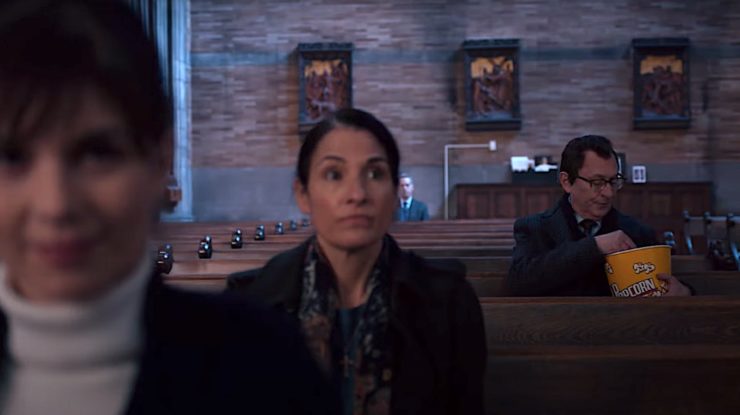
But! I am very willing for this to be dealt with in a fantastically batshit way in the coming weeks.
I haven’t even gotten into the “Lexi might be possessed” arc, OR “What is Sheryl’s deal???”, OR the seemingly real stigmata the gang encounters at the silent monastery, OR the UFO (!!!) Conspiracy (?!?!?!) but I assure you they’re all very much in my thoughts, and I’m vibrating with excitement to watch the new season.
You can find seasons one and two of Evil on Paramount +! The third season premiered on June 12, and new episodes are available on Sundays.










